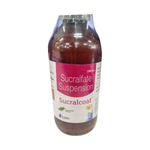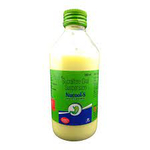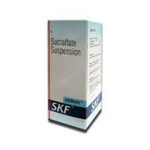Acefate Syrup

Acefate Syrup
Introduction to Acefate Syrup
Acefate Syrup is a medication primarily used to treat and prevent ulcers in the stomach and intestines. It is known for its protective properties that help in healing and preventing further damage to the stomach lining.
Composition of Acefate Syrup
Acefate Syrup contains the active ingredient Sucralfate, which forms a protective barrier over ulcers or damaged areas in the stomach and intestines.
Uses of Acefate Syrup
- Treats and prevents stomach and intestinal ulcers
- Helps with gastric and duodenal ulcers
- Alleviates symptoms of acid reflux and gastritis
- Prevents stress ulcers in critically ill patients
- Protects the stomach lining from damage caused by certain medications
Side effects of Acefate Syrup
Common side effects:
- Constipation
- Dry mouth
- Stomach discomfort
Serious side effects:
- Allergic reactions such as rash or itching
- Nausea or vomiting
- Dizziness
- Difficulty breathing or swelling (requires immediate medical attention)
Precautions of Acefate Syrup
Use Acefate Syrup with caution if you have kidney problems as it can cause aluminum buildup. It is contraindicated in patients with hypersensitivity to the drug or its components. It can interfere with the absorption of certain medications, vitamins, and minerals, so it should be taken separately, typically 30 minutes apart. Avoid taking it within 2 hours of antacids as this may reduce its effectiveness.
How to Take Acefate Syrup
- Take 10 milliliters (1 gram) of Acefate Syrup four times a day
- Consume on an empty stomach, at least 1 hour before meals or 2 hours after meals
- Swallow the syrup whole with water and do not chew or crush
Conclusion of Acefate Syrup
Acefate Syrup is an effective medication for treating and preventing ulcers in the stomach and intestines. By forming a protective barrier, it promotes healing and prevents further damage. However, it is important to follow the prescribed dosage and take necessary precautions to avoid potential side effects.
Similar Medicines
Related Faqs

Is Acefate available or sold over the counter?
No Acefate is a medication that requires a prescription from a healthcare professional It is not accessible for purchase without a prescription Acefate is classified as a prescription drug due to its potentially potent effects and the need for medical supervision in determining the appropriate dosage and duration of treatment As a prescriptiononly medication Acefate is regulated to ensure patient safety and prevent misuse or unintended complications It is crucial for individuals to consult with their healthcare provider before considering the use of Acefate to ensure that it is suitable for their specific medical condition and to receive proper guidance on its usage Under no circumstances should Acefate be taken without a prescription as this can pose serious health risks and may interfere with existing medical treatments or conditions It is always recommended to seek professional medical advice before initiating any new medication or treatment plan

Is Acefate a narcotic drug?
No Acefate is not classified as a narcotic drug It belongs to a different category of substances and does not possess the characteristics or effects typically associated with narcotics Acefate is actually a medication that falls under the class of cholinesterase inhibitors This means that it works by inhibiting the enzyme cholinesterase which breaks down acetylcholine in the body As a result the levels of acetylcholine in the brain increase leading to improved cognitive function and muscle control Acefate is commonly prescribed for the treatment of conditions such as Alzheimers disease dementia and myasthenia gravis It is important to note that although Acefate is not a narcotic it should still be used as directed by a healthcare professional and any potential side effects or interactions with other medications should be discussed with a doctor or pharmacist

Is Nikocid an antibiotic/sulfa drug/pain-killer/PPI?
that is used to treat and prevent ulcers in the stomach and intestines Nikocid works by creating a protective coating on the ulcers allowing them to heal and preventing further damage from stomach acid This medication is commonly prescribed to individuals who have conditions such as gastritis peptic ulcers or gastroesophageal reflux disease GERD Nikocid belongs to a class of drugs known as cytoprotectants which are specifically designed to protect the lining of the gastrointestinal tract Unlike antibiotics sulfa drugs PPIs or painkillers Nikocid focuses on providing a barrier against irritation and damage rather than directly targeting bacterial infections or reducing acid production It should be noted that Nikocid is not intended for immediate relief of symptoms such as heartburn or indigestion but rather for the longterm management and prevention of ulcers It is important to follow the recommended dosage and usage guidelines provided by a healthcare professional when taking Nikocid
Related Posts

1:15
Is Your Baby Suffering From Acid Reflux?

1:15
Where do stomach acid come from?

1:15
Heartburn or Acid Reflux?

1:15
Do you experience stomach bloating? Let us investigate the core reason..

1:15
The Best Foods to Eat and Avoid In Stomach Ulcer.

1:15
How to Increase Your Child’s Weight Naturally? Healthy Diet Tips for Parents!

1:15
Are Your Hormones Out Of Balance? Signs & Symptoms!

1:15
Amazing Benefits of Flaxseeds | Best Way to Eat Flax Seeds Daily!

1:15
Why Is There Blood in Your Poop? Causes, Symptoms, and When to See a Doctor!

1:15
How Do You Know If You Have a Vaginal Infection? Warning Signs!
Disclaimer : This information is not a substitute for medical advice. Consult your healthcare provider before making any changes to your treatment . Do not ignore or delay professional medical advice based on anything you have seen or read on Medwiki.
Acefate Syrup
Prescription Required
Packaging :
bottle of 200 ml Syrup
Manufacturer :
Assam Chemical & Pharmaceutical Pvt LtdComposition :




























.svg)
